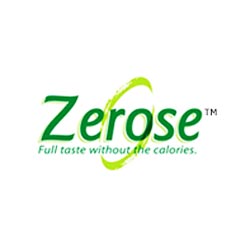Even though I am turning into quite the diet diva, I admit I still like my sweets. Whenever I read of new artificial sweeteners my interest is definitely peaked. I first read about Zerose in a health magazine. Although I haven’t tried this product yet, it looks promising as a healthier sugar-substitute. On the official Zerose website there are also some recipe suggestions using this new zero-calorie sweetener, including Zerose Cheesecake, Zerose Strawberry Smoothie and Zerose Granola. It’s definitely worth a try.

Zerose is a relatively new artificial sweetener that contains zero calories, is organic and Kosher certified.
Zerose sweetener is the latest in zero-calorie sweeteners, and is a brand name used by Cargill for erythritol. This chemical is different from other no calorie sweeteners because it is the only natural polyol sugar alternative that does not have any calories. Technically, it has already been eaten by humans for thousands of years as it is found in many kinds of fruits as well as mushrooms and foods such as soy sauce, wine, and some cheeses. Currently it is utilized in the production of reduced-calorie foods and beverages in addition to some tabletop products.
The benefits of Zerose are that it does not contain any calories, it is naturally derived, it is compatible with a diabetic diet, it doesn’t lead to tooth decay, and it is even Kosher certified. Though it is not as sweet as sugar itself, it is a very pleasant tasting sweetener choice for individuals who require a diet for diabetes or who are looking for a sweet alternative to sugar that will allow them to enjoy the flavor without a large caloric intake.
Erythritol has been created since 1990. It is formed through the process of fermentation and then added in bulk to many different products to sweeten them without increasing their calorie count. Typically, it is made by fermenting corn, sugar beets, or wheat. The carbohydrate from the vegetable is then mixed with water and a natural culture to ferment. It is a similar process to the method that is used to turn milk into yogurt. The result is then filtered and crystallized and allowed to dry so that the end product has a purity of a minimum of 99.5 percent.
The chemical has been approved of by many countries and is recognize as safe for consumption. Since 1990, it has been permitted for use in Japan and achieved this same right in the United States in 2000. Canada and the European Union have also both given their approval for the sweetener since 2004.
It is important, though, to know that relying on artificial zero-calorie sweeteners is not a solution to efforts to lose weight. Though they can be beneficial in some circumstances, it is much more effective to simply adopt a healthier lifestyle, including a nutritious diet and regular exercise. Studies have continually shown that using no-cal or low-cal sweeteners don’t necessarily have any impact on weight loss, so it is typically recommended that if the original product has too many calories, it should simply be avoided altogether or eaten in much smaller portions, instead of replacing it with a lower calorie version.
Despite the research, for myself, if I am given the opportunity to indulge a bit in a sweet treat that is prepared with a zero-calorie sweetener then life is good.
Other Related Posts and Articles you May Find Interesting: “Stevia Sugar-Substitute: A Healthy Artificial Sweetener”, “Zero Calorie Food Flavorings“, “Sensa Review – Will Sensa Help You Lose Weight?” and “Health Effects Caused By Aspartame“.





I am personally believe in healthy diet. I am used to take healthy food also. But sometimes we can’t control our body also! But I think Zerose – A New Zero-Calorie Sweetener is the best one. I will purchase this weekend only! Actually my one of the friend purchased this one before 2 days and his reviews great about it so I am thinking to buy it.